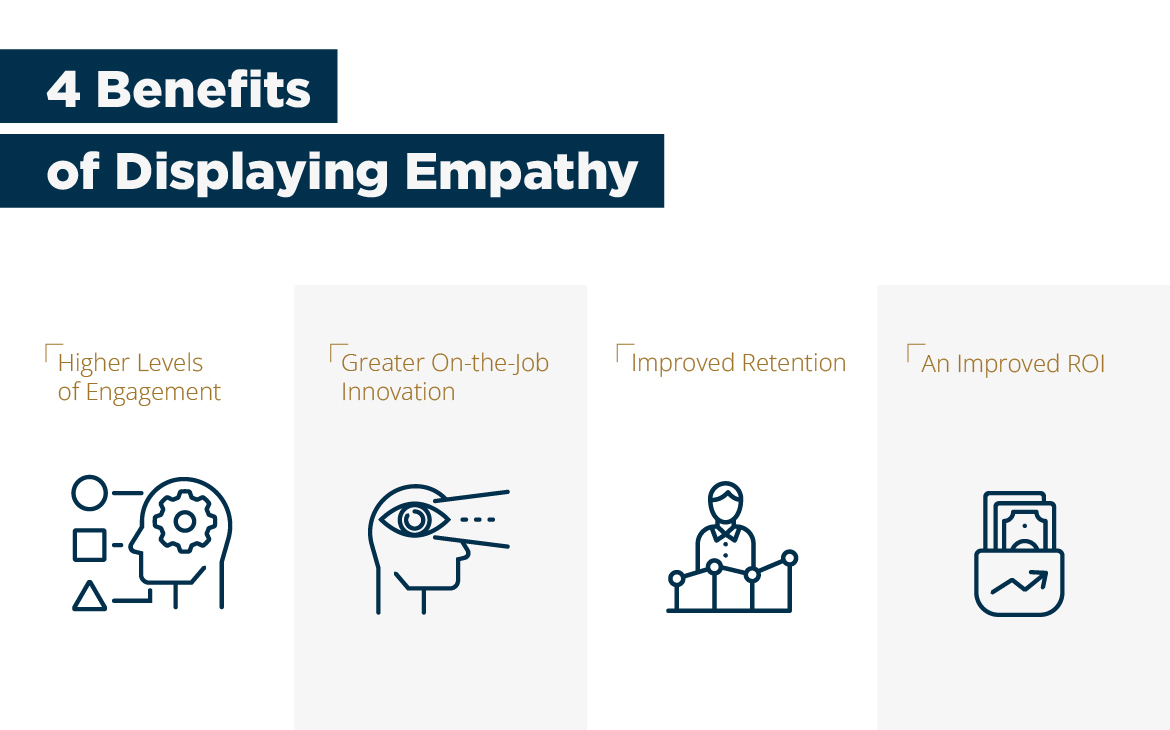4 Feb 2022
Empathy: This Year’s Most Important Leadership Skill
It’s a given that when you run an agency—or any business, for that matter—strong leadership skills are essential. And that during challenging times, the so-called “soft skills,” or people skills, take precedence. While we always knew that empathy was one of these key qualities, recent research has revealed it’s even more critical than we thought.
Empathy is defined as the ability to understand and share how someone else feels. While some of us are naturally more empathetic than others, all of us can work on developing it—and there are compelling reasons to do so.
According to Gallup Workplace, anger, stress, and sadness are on the rise—a trend that started before the pandemic, but was certainly accelerated by it. On a workplace level, this can translate to less productive agents, greater employee absenteeism, and an overall less-positive culture. On a human level, it means that some of your people could benefit from your help.
In one 2021 business survey–which happened to include the financial services industry—only one in four employees felt that their employer demonstrated sufficient empathy. Broadly speaking, an empathetic response was described as respecting those times when employees’ personal lives took priority, as well as taking a flexible approach to how work gets completed.
While every business (and boss) is different, the takeaway is clear: employers who prioritize their people’s health and safety get higher marks for empathy—and that can result in a number of business advantages.
The Business Benefits of Displaying Empathy
According to recent research, when you treat your agents and employees empathetically, they’re likely to return the favor in both their attitude and performance. Specifically, you’re likely to see:
- Higher Levels of Engagement – In a recent study of nearly 900 employees, 76% of workers who experienced empathy from their senior management reported feeling engaged at work, compared to only 32% of workers who felt their management was not empathetic. For agencies, that can translate to higher close ratios, improved customer service and fewer documentation errors.
- Greater On-the-Job Innovation – In that same study, empathic managers were linked to inspiring creative problem-solving among their staff. Sixty-one percent of employees with empathic leaders felt they thought innovatively on-the-job, compared to just 13% of employees with less-empathetic bosses. For agencies, giving agents and employees the confidence to think outside the box can result in new selling and marketing strategies as well as improved workflows.
- Improved Retention –When people feel valued and understood at work, they’re more likely to stay. For example, one 2021 State of the Workplace survey found that 90% of Gen Z workers—the fast-growing work demographic—say they’re more likely to stay with an employer that demonstrates empathy as opposed to one that does not. Given the high cost of recruiting and training in the life and health insurance setting, a little empathy can go a long way.
- An Improved ROI – You know that happier employees are more productive employees, but did you know that this can tangibly boost your ROI? The global consulting firm DDI developed a “Global Empathy Index,” ranking 160 businesses in terms of empathy. In financial terms, the top 10 most empathetic employers generated 50% more net income than their bottom 10 counterparts. Empathy is an unexpectedly-powerful business tool.
How to Cultivate Greater Empathy
You don’t need to adopt a soft and fuzzy management style to show your people that you care about their well-being. There are other ways to do so, including:
- Check-in with your agents and employees periodically. Ask them how they’re doing, and listen attentively to their answers. In addition to what they say, read their nonverbal cues. If someone is struggling, be responsive and make positive suggestions.
- Create an environment of open communication. Don’t interrupt or dismiss your people’s ideas off the cuff, and they will eventually feel comfortable sharing more information with you all around.
- Get familiar with all your company’s mental health resources, and make sure your people do, too. Make it clear that there is no weakness in taking advantage of them. Studies show that CEOs are 18% more likely than their employees to know what benefits are available, so don’t take for granted that your staff is aware of them.
- Give people the benefit of the doubt. If an employee asks to take extra time off or an agent shares why their production has been subpar, consider their words seriously and respond carefully and respectively.
In short, developing greater empathy may very well spur your agency to greater heights this year. It will allow you to build stronger relationships with those you lead, while empowering your people to do their best work. And of course, it’s also the right thing to do.




